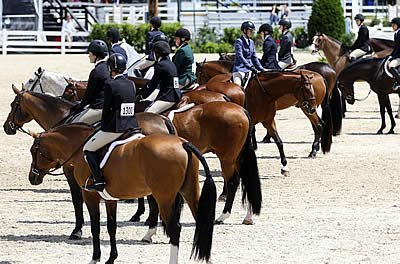As many of you are aware, a number of EHV-1 cases have recently occurred in California. As horsemen, our thoughts and prayers go out to all of those in California that are dealing with this. It is however a reminder to all equestrians that EHV-1 is always present and it is our responsibility to always be proactive to minimize any possible exposure. Although there are currently no reported cases of EHV-1 in Wellington, Equestrian Sport Productions (ESP) is taking active measures to protect horses at the Palm Beach International Equestrian Center (PBIEC) during the Winter Equestrian Festival (WEF).
In an abundance of caution, ESP management will be implementing the following biosecurity protocols:
- Anyone shipping horses into the PBIEC facility and any new back numbers processed will be required to sign a declaration stating that the horses entering the facility are healthy and have not competed in California or been in close contact with horses that competed in California within 14 days prior to their arrival.
- As we have done from the beginning of our FEI season, ESP will continue to enforce the protocols set by the FEI to enter the FEI compound. Please make sure you are logging the required temperatures twice per day in the FEI horse app and at least once on the morning of arrival to the FEI compound. Please ensure you are meeting requirements by downloading the FEI Horse App if you have not already done so. It can be found at the Google Play Store or Apple App Store.
It is our shared responsibility to keep our horses safe. We urge all equestrians to please remember and abide by the following biosecurity measures:
- Take all horses’ temperatures daily and immediately report any horse with a temperature above 101.5 degrees Fahrenheit or any signs of respiratory or neurological disease to your veterinarian and/or show management.
- Take the temperature of all horses prior to shipping to WEF or AGDF, and do not bring any febrile horses or horses exposed to fevers of unknown origin to the show.
- Avoid mixing of horses where possible, practice equine social distancing. Please consider isolating any new horse(s) introduced to your farm for a minimum of 14 days.
- Ensure good hygiene and biosecurity at the show and your home farms.
- Make sure your horses are currently vaccinated for influenza and EHV. Under no circumstances should a horse that has been vaccinated compete within 7 days.
- You should be able to document your horse’s normal temperature before arrival. Please do not ship horses with elevated temperatures. It is recommended that you establish a log of temperatures taken at least twice daily. If there is an elevated temperature for more than a 24-hour period, please consult your local veterinarian immediately.
- Every effort should be made to minimize stress and commingling of horses shipped long distances. Extra hours on a horse van or moving from stable to stable is the fastest way to compromise your horses’ and your neighbor’s horses’ health.
- Please take the time to review equine good hygiene practices and impress their importance to your grooms and barn managers in everyday care.
Further biosecurity protocols and additional resources can be found here:
United States Department of Agriculture Information on Equine Herpesvirus
American Association of Equine Practitioners FAQ on Equine Herpesvirus
United States Equestrian Federation Biosecurity Measures for Horses at Home and at Competitions
Information on the current known positive EHV-1 cases can be found here: https://equinediseasecc.org/alerts.
ESP has longstanding protocols to manage such events and will provide isolation facilities if and as required. Experience has taught us that early identification is key when dealing with disease outbreaks, and this requires cooperation from everyone within the community.
If you have any questions or concerns about your horse’s health, please contact our veterinary partners: Palm Beach Equine Clinic at 561-793-1599.
For more information, please visit www.PBIEC.com.

